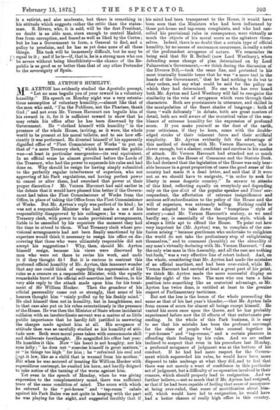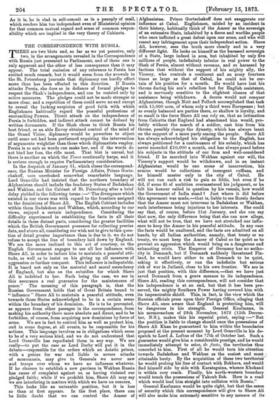MR. AYRTON'S HUMILITY.
MR. AYETON has evidently studied the Apostolic precept, "Let no man beguile you of your reward in a voluntary humility." His speech on Monday night was a very ostenta- tious assumption of voluntary humility,—almost like that of the man who said, "I'm the Publican, not the Pharisee, thank God ;" and not even Mr. Vernon Harcourt can beguile him of his reward in it, for it is sufficient reward to show that he may retain his office after he has been disowned by the Government. He "clothed himself with humility" in the presence of the whole House, inviting, as it were, the whole world to be present at his moral toilette, and to see how effi- ciently it was performed. He divested himself of his apparently dignified office of "First Commisioner of Works" to put on that of "a mere Treasury clerk," which he assured the public was—at least in particular emergencies—its real equivalent. In an official sense he almost grovelled before the Lords of the Treasury, who had the power to supersede his rules and had done so. Why should he resign for having simply submitted to the perfectly regular interference of superiors, who not approving of his Park regulations, and having perfect power to cancel or alter them, had exercised that power at their proper discretion ? Mr. Vernon Harcourt had said earlier in the debate that it would have pleased him better if the Govern- ment had taken the First Commissioner of Works from the Office, in place of taking the Office from the First Commissioner of Works. But Mr. Ayrton's reply was perfect of its kind ; he was not a responsible Minister who had made a use of his responsibility disapproved by his colleagues ; he was a mere Treasury clerk, with power to make provisional arrangements, liable to be eaneelled by his superiors the moment they had the time to attend to them. What Treasury clerk whose pro- visional arrangements had not been finally sanctioned by his superiors would think it necessary to resign his office on dis- covering that those who were ultimately responsible did not accept his suggestions ? Why, then, should Mr. Ayrton himself resign, because his views were disowned by men who were set there to revise his work, and undo it if they thought fit But it is curious to contrast this profound official hnmility of Mr. Ayrton, this innocent wonder that any one could think of regarding the supersession of his rules as a censure on a responsible Minister, with the equally remarkable burst of his official self-assertion last Session, in his very able reply to the attack made upon him for his treat- ment of Sir William _Hooker. Then the grandeur of his official personality came out so strongly, that some of his hearers thought him "vainly puffed up by his fleshly mind." He clad himself then not in humility, but in haughtiness, and in that case also put on his miles ostentatiously in the presence of the House. He was then the Minister of State whose incidental collision with an insubordinate servant was a matter of so little public importance that he hardly felt justified in answering the charges made against him at all. His arrogance of attitude then was as carefully studied as his humility of atti- tude now. Both were moral poses taken with consummate skill and deliberate forethought. ,He magnified his office last year. He humbles it this. Now "his heart is not haughty, nor his eyes lofty ; " he does not "exercise himself in great matters," or "in things too high" for him ; he "refrained his soul and "opt it low, like AB a -child that is weaned from his mother." BUt when he was accused of treating Sir William Hooker with supercilious contempt, he exalted his horn, and hardly deigned to take notice of the turning of the worm against him.
Yet even in the speech of Monday, when he was giving expression to the complementary mood, there was sufficient trace of the same condition of mind. The scorn with which he referred to the " pot-house " and " tap-room " cabals against his Park Rules was not quite in keeping with the part he was playing for the night, and suggested forcibly that if, his mind had been transparent to the House, it would have been seen that the Ministers who had been influenced by those pot-house and tap-room complaints, and who had cett- celled his provisional rules in consequence, were virtually as much the objects of his moral scorn as the agitators them- selves. Indeed, there is no doubt that a certain type of official humility, by no means of uncommon occurrence, is really a note of the profoundest arrogance of nature. We remember it* being said that Sir R. Bethell (now Lord Westbury), when defending some change of plan determined on by Lord Palmerston's Government,—we think during the discussion Of the Divorce Bill,—took the same line, and protested in his most ironically humble tones that he was "a mere tool in thO hands of the Government," that he had nothing to do but to obey orders, and say what could be said for the policy 0)2 which they had determined. No one who has ever hearcl both Mr. Ayrton and Lord Westbury will fail to recognise the similarity in the vein of arrogance which runs through their characters. Both are precisianists ie utterance, and skilled in the manipulation of the finest shades of language ; both of them "walk delicately" in debate, both are great masters of detail, both are well aware of the oratorical value of the sem- blance of extreme humility for the expression of profcand scorn. If you make yourself as the dust of the earth, your criticisms, if they be keen, come with the douhle- edged stroke of their inherent force and their artifieiel simplicity. Mr. Ayrton evidently felt the advantage of this method of dealing with Mr. Vernon Harcourt, who is clever enough, but a slasher, confident and careless in his rodeo of attack. Mr. Vernon Harcourt had attacked not ao much Mr. Ayrton, as the House of Commons and the Statute Book. He had declared that the legislation of the House was only bear- able because in a great proportion of cases the good sense of the country had made it a dead letter, and said that if it were not so we should have to emigrate, " in order to seek for liberty in some despotic country." In answer to attaeke of this kind, reflecting equally on everybody and depending only on the ipse dixit of the popular speaker and Times' cor- respondent, the affectation of extreme insignificance and anxious self-subordination to the policy of the House and the will of superiors, was extremely telling. Nothing c,oeld he better adapted to take down the " bumptious " style of oratory ;—and Mr. Vernon Harcourt's oratory, as we need hardly say, is essentially of the bumptious style, which is always a little apt to offend the House. To point out how very impotent he (Mr. Ayrton) was, to complain of the eon, fusion arising "because gentlemen who undertake to enlighten the world do not take the preliminary step of enlightening themselves," and to comment (humbly) on the absurdity of any man's virtually declaring with Mr. Vernon Harcourt, "I ana the only wise man in this Assembly, and all the rest are nothing but fools," was a very effective line of retort indeed. And, on the whole, considering that Mr. Ayrton had made the mistakes of an official martinet, and had been over-ruled, while Mr. Vernon Harcourt had carried at least a great part of his point, we think Mr. Ayrton made the more successful display on Monday night of the two. The man who can turn a false position into something like an oratorical advantage, as Mr. Ayrton has twice done, is entitled at least to the genuine respect of Parliamentary tacticians. But not the less is the lesson of the whole proceeding the same as that of his last year's blunder,—that Mr. Ayrton fails from excess of scorn for almost all beings except himself. Re. vented his scorn once upon the Queen, and he has probably experienced before now the ill effects of that unfortunate pro- ceeding. In the whole of this Park business, it is easy to see that his mistake has been the profound contempt for the class of people who take counsel together in " pot-houses " and "tap-rooms," and a certain pleasure in offending their feelings by his rules. And we are rather inclined to suspect that even in his procedure last Monday, a profound arrogance of judgment was at the bottom of his conduct. If he had had more respect for the Govern- ment which superseded his rules, he would have been more disposed to take umbrage at what they did, and to feel that there was not merely a want of confidence in this particular act of judgment, but a difficulty of co-operation involved in their censure, which should properly lead to resignation. And we further believe,—not so much that if Mr. Ayrton had resigned, as that if he had been capable of feeling that sense of annoyance at being over-ruled, that sense of mortification about him- self, which would have led to resignation, he would have bad a better chance of really high office in this country. As it is, he is clad in self-conceit as in a panoply of mail, which renders him too independent even of Ministerial opinion for that common mutual regard and sense of common respon- sibility which are implied in the very theory of Cabinets.



































 Previous page
Previous page